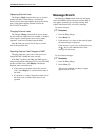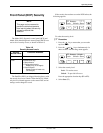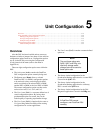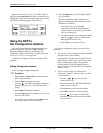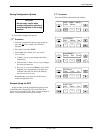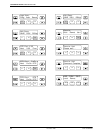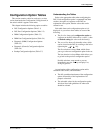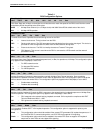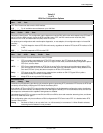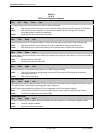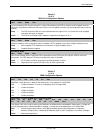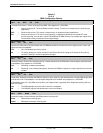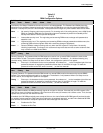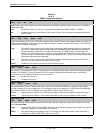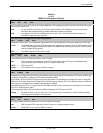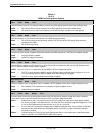
Unit Configuration
5-73615-A2-GB20-20 December 1996
Table 5-2
(1 of 3)
DSU Port Configuration Options
DTE Port: V.35
Next V.35 Prev
DTE Port
. Forces user data over the V.35 interface.
V.35 — For all available rates at distances up to 1000 feet.
RTS Cntrl: FrcOn
Next FrcOn DTE Prev
Request-to-Send Control
. This configuration option determines how the DSU will function with respect to the RTS lead. If
set to FrcOn, the DSU internally forces the RTS lead ON; if set to DTE, the DSU sends control mode idle (CMI)
whenever RTS is Off, and data mode idle (DMI) when RTS is ON.
For point-to-point configurations with nondisruptive diagnostics, or rate adaption, this configuration option is forced ON
internally.
FrcOn — The DSU keeps the internal RTS ON continuously, regardless of whether RTS at the DTE interface is ON
or Off.
DTE — The DSU responds to RTS from the DTE.
CTS Cntrl: Std
Next Std =RTS Delay FrcOn Prev
Clear-to-Send Control
. Controls the behavior of the CTS lead.
Std — CTS is normally controlled by the DTE’s RTS lead; however, the CTS lead can be affected by the
response to abnormal conditions, such as no signal or test mode, as determined by configuration options
RTS Cntrl, and Circ Assur.
=RTS — RTS Control must be forced on (RTS Cntrl is set to FrcOn). In point-to-point configurations where RTS
Cntrl is forced ON, CTS Cntrl can also be forced ON if the DTE interfaces require no delay between RTS
Cntrl and CTS Cntrl (0 ms), but does not require an RTS-to-CTS transition.
Delay — CTS does not go Off in response to a network alarm condition or CMI. CTS goes Off only after a
successful backup connection is established.
FrcOn — Keeps CTS on as long as the DSU has power.
AntiStream:Disab
Next Chang Prev
Antistreaming
. Antistreaming provides circuit protection against a streaming DTE (a defective DTE that has its RTS lead
constantly turned ON) by clamping the RTS lead of the tributary DSU.
If the tributary DTE turns ON RTS longer than the time specified for the Antistreaming configuration option, the tributary
DSU turns on its alarm indicator and clamps RTS to Off. Although the tributary DTE is not allowed to send, the DSU can
still respond to commands and is capable of being tested or disabled.
Upon detecting that RTS is no longer turned ON, the DSU turns Off its alarm and resets the streaming timer, and allows
the DTE to send data once again.
This configuration option only has an effect at a DSU configured with RTS Control set to DTE. It is disabled when RTS
Control is set to FrcOn.
Chang — Set timer to Disab, or to any value from 1 to 100 second(s) in increments of 1. When Disab is selected,
streaming terminal detection is not provided.



